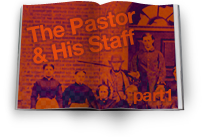Dear Senior Pastor, Sincerely, the Associate Pastor
Some writing invitations feel like an offer to walk through a minefield. The title for this article, which was given to me, should tell the reader that’s exactly how the invitation to write this piece felt. What do I as an associate pastor wish the senior pastor knew? I’m sure no one will try to pick through this article looking for veiled criticisms and complaints against my boss. Which editor at 9Marks do I thank for setting me up?
So let me state up front: I love my church and the pastor I currently serve. But I’ve been around churches long enough, and have enough friends in church staff positions, to have picked up on a number of tendencies worth noting.
Here, then, are a few thoughts for the senior pastors and would-be senior pastors out there who work or will work with associate pastors.
YOU ARE NOT AN ISLAND
The first is that you are not an island, so don’t think that the uniqueness of your role somehow isolates you from others.
Senior pastors have a special and wonderful role in Christ’s church, but like folks in leadership everywhere, they face a sinister temptation to massively overvalue their uniqueness in a way that isolates them from accountability and input and burden-sharing.
It’s not just pastors. I’ve known managers who thought this way—I should know, I struggled with this when I was one. I’ve known business owners who thought this way—I should know, I struggled with this when I was one. I’ve known government officials who thought this way— yes, I was tempted to think this when I was one. And I’ve known senior pastors who thought this way. No, I don’t know that from personal experience, but twenty years of consistent observations allows even me to spot a trend.
So, senior pastors, don’t buy into the fallacy of thinking that your role is so unique, your sense of responsibility so singular, that “No one can really understand my perspective and the burden I bear.” This line of reasoning often comes with a satanic corollary: “So no one here can really know me and share my burdens and speak into my life.” That is not true for angst-ridden 15-year olds. It’s not true for bosses, business owners, or politicians. And it’s not true for senior pastors, either.
I’m writing rather sharply right out of the gate because this is the most important point in this article. I’ve seen this faulty line of thinking cause senior pastors—often unconsciously, I think—to wall themselves off from the very people God has placed in the middle of their lives. Maybe they haven’t attained total isolation. Maybe they do talk to a few other senior pastors they got to know in seminary because “they understand what it’s like.” But, of course, these folks aren’t in their daily lives. And, even if they do try to be transparent with each other, they only know what the other wants them to know. That’s very dangerous. That kind of relationship lets you check the “transparency” box without ever really risking critique. This is not a recipe for the correction and input that we all need, especially senior pastors.
So resist the urge to think that, because people around you may not understand everything about you, they can’t understand anything, or the most important things. True, no one will perfectly understand your perspective: welcome to being just like every other human being. But I’ve often found in my own experience that even those who “don’t know what it’s like to be the guy where the buck stops” can still surprise me with their understanding, insights, and corrections. Solomon was incisively wise in Proverbs 27:10: “Better a neighbor nearby than a brother far away.” Those are good words for every senior pastor to take to heart.
CHILL OUT: YOUR ASSOCIATE IS NOT A THREAT
My second piece of advice to senior pastors is to chill out: the congregation’s affection for your associate is an asset, not a threat.
I’m sure this is hard. In our flesh we want people to like us best, to appreciate us the most. And when we learn that someone actually looks forward to the associate preaching, or prefers his counseling, or wants to attend his Bible study class, our flesh can at least feel disappointed, if not threatened.
But senior pastors should realize what a blessing this is. You want your people to love and appreciate the ministry of your associate, as well as all the other elders. And, yes, this even means that some of them may prefer the ministry of the other guy. That’s a good thing. For one thing, it shows you’ve led well to the degree that you were responsible for bringing the guy on. It also means that you have a useful yokefellow in the ministry. And the more you actually work to help your congregation grow in their affection for the guy, the more useful your coworker will be.
If you love your flock, you’ll be happy when they are well fed and cared for—regardless of the source.
THEY KNOW YOU’RE NOT PERFECT
Third, your fellow pastors and elders know you’re not perfect. Complementing your limitations is a joy, not a burden.
I love the scene in the movie “Patriot Games” where the character of Jack Ryan (played by Harrison Ford) tells a frantic group of political types who are trying to suppress a crisis that already happened that it’s seldom effective to try to diffuse a bomb after it has gone off. It seems obvious, but it’s amazing how much time all of us (senior pastors included) spend trying to hide or deny areas of incompetence even though they are painfully obvious to everyone who knows us. Realize that your associates are especially aware of these areas, and that they respect you despite their knowledge of your limitations.
Now, senior pastors need to grow and improve, like everyone else. But hopefully you’ve realized that where your associates excel in areas of your weakness, it is a joy for them to love you and the church by filling in for your weaknesses, whether it’s administration, or music, or counseling, or whatever. Whether these are areas you need to delegate or grow in can be a complicated question, but know that the decision to delegate it is not necessarily failure. It may just be a chance for someone else to love you and the church in a more pronounced way.
MAKE IT EASY FOR YOUR STAFF TO GIVE INPUT
Fourth, make it easy for your staff to give input. You need—and your church needs—a culture of giving and receiving godly criticism and encouragement.
Certainly there are unique things about being the senior guy. For one thing, you are the one who is best positioned to build or kill various aspects of the culture of your staff. And your influence will be felt especially in the culture of encouragement and critique. You are the one who needs to lead out in giving and receiving godly encouragement and giving and receiving godly criticism.
The senior pastor at our church has led in this by establishing a time every week for the rest of the staff to give feedback on his sermons and other aspects of the public services. About 30 minutes of that time is devoted to feedback on the morning sermon. And while there is always a lot to encourage, our senior pastor makes the staff feel safe when they give some pretty specific critiques, too. We would never be able to do this if he didn’t invite this feedback and make the time happen. And I think he would say that his preaching has consistently grown through the weekly feedback the staff provides.
You may want to structure this time differently, but know that your associates are not going to stick their necks out to give feedback—at least not too many times—if you don’t specifically invite this input. But if you do this, I think you will find it to be both a blessing for you and an instructive way to foster an honest and loving culture of critique and encouragement that blesses the ministry of your church.
YOUR STAFF WANTS TO BE PASTORED
Finally, I have a quick news flash for any pastor-as-CEO types reading this article: If your staff really wanted to work for a slick, streamlined corporation, they’d likely be pulling down way more money than you could ever pay them, working in a nice office at Microsoft or Ford. But they don’t want that. They want to be a part of pastoring a local church, the bride of Christ, a body, a family. And pastoring a local church ultimately means building relationships, not organizational charts and well-worked-out strategies.
In other words, your staff wants to be pastored. This means that relationships are the best management structure and strategy.
Certainly churches will benefit from organization, but your staff, especially the other pastors, still want to be pastored, not just managed. And they want to pastor the church with you, together. If you’ve established a plurality of elders, and the elders all regularly shepherd one another, this may be easier to cultivate among your staff. But even without that, you are the one who can set the tone of pastoral concern and relational leadership.
So pray with your associates. Ask about your associates’ hearts and families. Labor and shepherd with your associates. That will likely mean more to them than anything you are likely to teach them from the latest management book.
Even more challenging, let your associates pastor you. That’s part of why God put them in his church that you are leading for this brief time. You want the members of your church to show their submission to God by submitting to the elders. Likewise, therefore, you can show your submission to God by submitting to the other elders you work with day in and day out. Remember, whatever it means to be the main pastor in a church, your associates will be called on by God to give an account for you. Hebrews 13:17 is for all of us, senior pastors included: “Obey your leaders and submit to their authority. They keep watch over you as men who must give an account. Obey them so that their work will be a joy, not a burden, for that would be of no advantage to you.”
SOME OF GOD’S BEST BLESSINGS MAY BE CLOSER THAN YOU THINK
Over the years it has been a joy to me that the senior pastor with whom I serve is amazingly cognizant of all these principles. I learned several of them directly from him. And I think I can say for him that he has known great benefit in his life and ministry by living by them—even though God has humorously given him an eclectic and rag-tag group of associates.
I hope the same for every senior pastor. I hope that as you give attention to these things, you will know greater protection and freedom and encouragement and fruitfulness and rest. God is so good, and some of his best blessings may be closer than you think.









